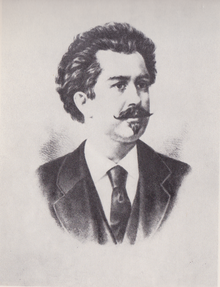Elemér Szentirmay

Elemér Szentirmay (born János Németh 9. November 1836 in Sopronhorpács , small field-Sopron Fertőd , Empire of Austria ; died 3. October 1908 in Budapest ) was a Hungarian composer.
Life
János Németh studied law and became a judge in Fehér County . From 1862 he ran a farm in Alsószentiván and became friends with the older poet János Vajda . In 1865 he moved to Pest , where he became head of the damage assessment department at "Első Magyar Általános Biztosító Társaság" (First Hungarian Insurance Company). After his retirement he moved to Cinkota (now in the 16th district in Budapest ).
Since 1871 he called himself Elemér Szentirmay. He had already composed and now wrote vocal parts for folk pieces. His songs were interpreted by Lujza Blaha and thus became famous. Some of his 400 or so songs became Hungarian folk good. Pablo de Sarasate plagiarized the melody from the song "Csak egy szép lány van a világon" in the third movement of his gypsy tunes . He did not name Szentirmay in the composition until after his reference. Szentirmay melodies were also found in two of the Hungarian Dances by Johannes Brahms ; Béla Bartók and Zoltán Kodály performed his composition Utca, Utca in their first folk song collection in 1906. Szentirmay also wrote novellas and plays, the play "Egy kis csel" was premiered in 1863 and "A pórul járt kommisszárius" in 1868 at the Buda People's Theater.
Szentirmay was buried in a grave of honor on the Kerepesi temető .
Works (selection)
- Zengö bokor énekhangra zongorakisérettel . Score. Budapest: Táborszky és Parsch, 1876
- Zengö bokor: 1. Selymes Panna, 2. Sezeretni, 3. Gyászba borult, 4. Hét utzca van a mi falunkban, 5. A biróval, 6. A rózsának tövise van; 136ik mü . Score. Budapest: Táborszky és Parsch, 1886
literature
- Constantin von Wurzbach : Németh, János . In: Biographisches Lexikon des Kaiserthums Oesterreich . 20th part. Kaiserlich-Königliche Hof- und Staatsdruckerei, Vienna 1869, p. 182 ( digitized version ).
- György Kerényi: Szentirmay Elemér és a magyar népzene . Budapest: Akadémiai Kiadó, 1966 (not viewed).
- G. Cs. Dávid: Szentirmay, Elemér. In: Austrian Biographical Lexicon 1815–1950 (ÖBL). Volume 14, Verlag der Österreichischen Akademie der Wissenschaften, Vienna 2012–, ISBN 978-3-7001-7312-0 , p. 145.
Web links
- Literature by and about Elemér Szentirmay in the catalog of the German National Library
- Literature by and about Elemér Szentirmay in the bibliographic database WorldCat
- Németh János (Szentirmay Elemér) , at MEK
- Elemér Szentirmay at Discogs (English)
Individual evidence
- ↑ A copy of the letter in the documentation of the letter copy at Commons,
- ↑ freely translated: For me you are the most beautiful girl in the world, (my rose, my dove ...)
-
↑ Peter Jost: Stolen Melodies - Sarasate's “Gypsy Ways” under suspicion of plagiarism , G. Henle Verlag , August 19, 2013
The process is different with Joshua S. Walden : Sounding authentic: the rural miniature and musical modernism . New York: Oxford University Press, 2014, p. 99, afterwards Szentirmay was disappointed by Sarasate's hesitant reaction because, even after the correspondence, his name did not appear in the music or in the concert programs. - ^ Joshua S. Walden: Sounding authentic: the rural miniature and musical modernism . New York: Oxford University Press, 2014, p. 99
| personal data | |
|---|---|
| SURNAME | Szentirmay, Elemér |
| ALTERNATIVE NAMES | Németh, János (maiden name); Árpád Jenő (pseudonym) |
| BRIEF DESCRIPTION | Hungarian composer |
| DATE OF BIRTH | November 9, 1836 |
| PLACE OF BIRTH | Sopronhorpács , Sopron-Fertőd small area |
| DATE OF DEATH | October 3, 1908 |
| Place of death | Budapest |

